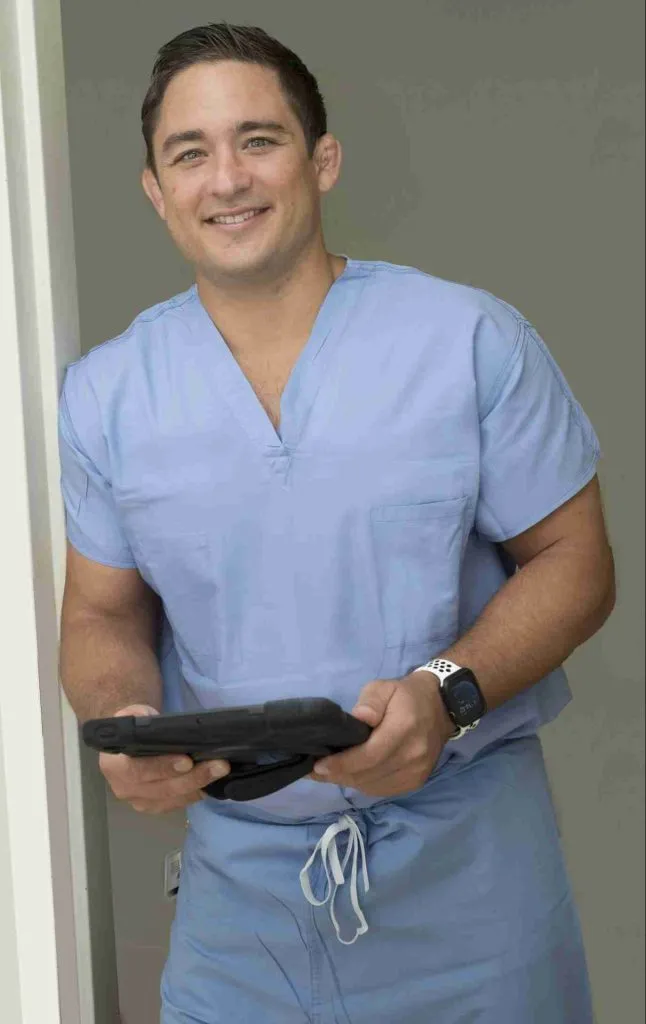The time has come for you to have a hip or knee joint replaced. Years of pain, stiffness, and limited activities have gone by, and you are ready to get your life back. Deciding to have joint replacement surgery is a significant commitment and if life-changing. There are many things to consider, most importantly, who will be your surgeon.
Looking for a surgeon may be overwhelming. There are so many different certifications and added letters to the end of names and titles these days.
You might be wondering what the difference between a board-certified surgeon and a fellowship-trained surgeon. Maybe you find yourself asking why you should have surgery by a fellowship-trained adult reconstruction surgeon. “Wouldn’t any orthopedic surgeon know how to do the job?”
What does an orthopedic fellowship entail?
Most doctors are either known as general or specialists in their field. The specialists are the ones that go on to fellowship training. During this training, the doctor works closely with an expert and leader within their specific field, growing and learning throughout the year that they work together.
All United States Orthopedic surgeons first attend school for over a decade. They complete 4 years of college, 4 years of medical school, and then a 5-year residency within the field of orthopedics. At this point, everyone that passes their license and board exams is considered board certified.
For some orthopedic surgeons, training does not stop there—some desire to go on to a fellowship program. But not everyone is admitted to these programs.
If a surgeon is selected, they will continue with their training by obtaining a more comprehensive education, on-the-job experience, and a thorough understanding of how to evaluate and treat their patients.
One specific fellowship is the Adult Reconstruction Surgeon Fellowship, designed for orthopedic doctors to develop a deeper understanding and skill set to better manage arthritic and degenerative joints such as the hips and knee.
In addition to passing all licensing and board exams, these orthopedic surgeons must prove that they have mastered the knowledge and skill set required to be considered a fellowship-trained adult reconstruction surgeon. But they must also uphold a higher standard of character, placing their patient’s wellbeing above all else.
Does working with a Fellowship-Trained Adult Reconstruction Surgeon make a difference in your treatment and outcome?
Yes. It is easy to see why someone who spent more time becoming an expert in hip and knee reconstruction would be the one to choose for your hip or knee problem.
More training, more exposure, and more experience with a variety of patients will simply yield better results.
Several studies over the years have looked at the differences between fellowship-trained surgeons and surgeons who have not furthered their education.
Research has demonstrated that fellowship-trained surgeons demonstrate the ability to complete reconstruction surgeries more quickly and more efficiently. Their patients have a shorter hospital stay and a higher rate of patients discharging directly home versus going into skilled or assisted living situations.
It has also been found that there is a lower risk of periprosthetic joint infection in cases that were completed by a fellowship-trained surgeon.
Even more importantly, with our current opioid crisis in the United States, surgeries completed by a fellowship-trained surgeon results in less use of opioids for pain management.
As you can tell, overall, fellowship-trained surgeons demonstrate better outcomes, fewer complications, and decreased costs to the health care system.
What does FAAOS and FAAHKS mean?
FAAOS stands for Fellow of the American Academy of Orthopaedic Surgeons. It is an additional designation for orthopedic surgeons who complete all of the requirements for membership: The FAAOS designation demonstrates that your orthopaedic surgeon as a leader of your musculoskeletal health team with the level of skills, training, experience and professionalism consistent with the high quality and standards established by the American Academy of Orthopaedic Surgeons.
- Certification by the American Board of Orthopaedic Surgery (ABOS)
- In an practice of orthopedic surgery in the U.S. for at least 36 months immediately prior to induction
- Maintenance of a full, unrestricted, and unlimited license to practice medicine or full-time service in the federal government
- Compliance with the AAOS Standards of Professionalism
- Complete the Active Fellow Member Application
- Membership Committee and AAOS Board of Director Approval of Application
FAAHKS stands for Fellow of the American Association of Hip and Knee Surgeons. It is an additional designation for board-certified FAAOS members who perform a significant number of hip and/or knee replacements annually.
Why choose to work with a fellowship-trained adult reconstruction surgeon?
Dr. Morton is a fellowship-trained orthopedic surgeon in hip and knee reconstruction. After completing 8 years of schooling and 5 years of residency training, he decided to obtain his ACGME-approved fellowship training in Adult Reconstruction to confidently say he was helping his patients in the best way possible. He is specialized in robotic joint replacements, anterior hip replacements, sports injuries, and revision surgery.


